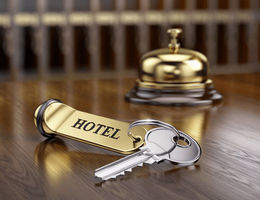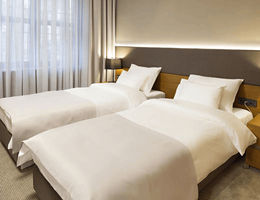How to create a financial forecast for a hotel?
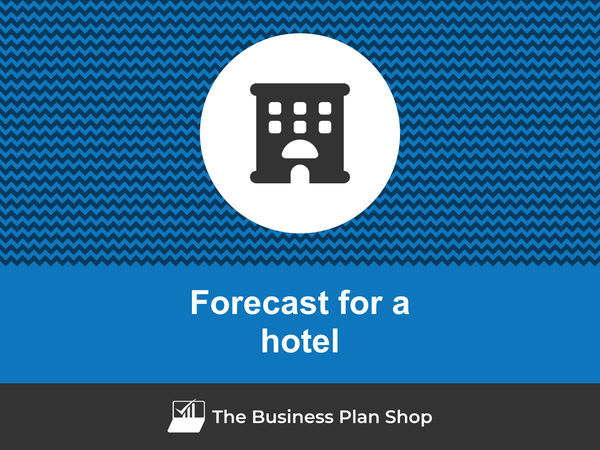
Creating a financial forecast for your hotel, and ensuring it stays up to date, is the only way to maintain visibility on future cash flows.
This might sound complex, but with the right guidance and tools, creating an accurate financial forecast for your hotel is not that hard.
In this guide, we'll cover everything from the main goal of a financial projection, the data you need as input, to the tables that compose it, and the tools that can help you build a forecast efficiently.
Without further ado, let us begin!
Why create and maintain a financial forecast for a hotel?
Creating and maintaining an up-to-date financial forecast is the only way to steer the development of your hotel and ensure that it can be financially viable in the years to come.
A financial plan for a hotel enables you to look at your business in detail - from income to operating costs and investments - to evaluate its expected profitability and future cash flows.
This gives you the visibility needed to plan future investments and expansion with confidence.
And, when your trading environment gets tougher, having an up to date hotel forecast enables you to detect potential upcoming financing shortfalls in advance, enabling you to make adjustments or secure financing before you run out of cash.
It’s also important to remember that your hotel's financial forecast will be essential when looking for financing. You can be 100% certain that banks and investors will ask to see your numbers, so make sure they’re set out accurately and attractively.
Need a convincing business plan?
The Business Plan Shop makes it easy to create a financial forecast to assess the potential profitability of your projects, and write a business plan that’ll wow investors.

What information is used as input to build a hotel financial forecast?
A hotel's financial forecast is only as good as the inputs used to build it.
If you are creating (or updating) the forecast of an existing hotel, then you mostly need your accounting information, key historical operating non-financial data, and your team’s input on what to expect for the coming years.
If you are building financial projections for a hotel startup, you will need to have done your research and have a clear picture of your competitive environment and go-to-market strategy so that you can forecast sales accurately.
For a new venture, you will also need a precise list of the resources needed to keep the hotel running on a day-to-day basis and a list of the equipment and expenditures required to start the business (more on that later).
Let's now take a closer look at the elements that make up your hotel's financial forecast.
The sales forecast for a hotel
The sales forecast, also called topline projection, is normally where you will start when building your hotel financial forecast.
Creating a coherent sales projection boils down to estimating two key drivers:
- The average price
- The number of monthly transactions
To do this, you will need to rely on historical data (for an existing business), market research data (for both new and existing hotels), and consider the elements below:
- Seasonal Demand: You may experience fluctuations in your average price and number of monthly transactions depending on the time of year. For example, during peak tourist season, you may be able to charge higher prices and have more transactions compared to the slower off-season.
- Economic Conditions: The state of the economy can greatly influence your business's performance. In times of economic downturn, people may be more cautious with their spending, leading to a decrease in both your average price and number of transactions.
- Competitors: Your competitors' pricing and offerings can also impact your business's performance. If a new, luxurious hotel opens nearby, it may attract your customers with lower prices or better amenities, causing a decrease in your average price and number of transactions.
- Events and Conferences: Hosting events and conferences can have a significant impact on your sales forecast. During major events or conferences in your area, you may see an increase in demand for your hotel, allowing you to charge higher prices and have more transactions.
- Online Reviews and Ratings: In today's digital age, online reviews and ratings can greatly influence a customer's decision to book with your hotel. Positive reviews and high ratings can lead to an increase in both your average price and number of transactions, while negative reviews can have the opposite effect.
After the sales forecast comes the operating expenses budget, which we will now look into in more detail.
Need a convincing business plan?
The Business Plan Shop makes it easy to create a financial forecast to assess the potential profitability of your projects, and write a business plan that’ll wow investors.

The operating expenses for a hotel
Once you know what level of sales you can expect, you can start budgeting the expenses required to operate your hotel on a daily basis.
Expenses normally vary based on how much revenue you anticipate (which is why, from experience, it is always better to start your forecast with the topline projection), and where your business is based.
Operating expenses for a hotel will include some of the following items:
- Staff costs: This includes salaries, wages, benefits, and training expenses for all hotel staff, including front desk, housekeeping, restaurant, and maintenance staff.
- Accountancy fees: You will need to hire an accountant to manage your hotel's financial records, prepare tax returns, and provide other financial services.
- Insurance costs: As a hotel owner, you will need to pay for insurance coverage to protect your property, guests, and employees from any potential risks and liabilities.
- Software licences: In order to efficiently manage your hotel's operations, you will need to purchase software licences for property management systems, online booking platforms, and other essential tools.
- Banking fees: You will need to pay for banking fees associated with managing your hotel's finances, such as transaction fees, wire transfer fees, and account maintenance fees.
- Utilities: This includes expenses for electricity, water, gas, and other utilities needed to run your hotel.
- Housekeeping supplies: In order to maintain a clean and comfortable environment for your guests, you will need to purchase cleaning supplies, linens, and other housekeeping essentials.
- Food and beverage costs: If your hotel has a restaurant or offers room service, you will need to budget for food and beverage costs, including ingredients, supplies, and labor.
- Marketing and advertising expenses: In order to attract guests and promote your hotel, you will need to spend money on marketing and advertising efforts, such as creating a website, printing brochures, and running social media ads.
- Property maintenance: This includes expenses for regular maintenance and repairs of your hotel's physical structure, as well as any necessary upgrades or renovations.
- Guest amenities: In order to provide a comfortable and enjoyable experience for your guests, you will need to budget for amenities such as toiletries, towels, and other guest supplies.
- Taxes and licenses: You will need to pay for various taxes and licenses required to operate your hotel, such as occupancy tax, business license, and liquor license.
- Security: In order to ensure the safety and security of your guests and employees, you will need to invest in security measures such as cameras, alarms, and security personnel.
- Training and development: To maintain a high level of service and keep up with industry standards, you will need to provide ongoing training and development opportunities for your staff.
- Administrative expenses: This includes expenses for office supplies, postage, and other administrative costs associated with running your hotel.
This list will need to be tailored to the specificities of your hotel, but should offer a good starting point for your budget.
What investments are needed to start or grow a hotel?
Your hotel financial forecast will also need to include the capital expenditures (aka investments in plain English) and initial working capital items required for the creation or development of your business.
For a hotel, these could include:
- Furniture and fixtures: This includes items such as beds, dressers, chairs, and tables that are used in guest rooms, common areas, and conference rooms.
- Renovations and upgrades: This may include updating the lobby, guest rooms, or other areas of the hotel to maintain a modern and appealing aesthetic for guests.
- Technology and equipment: This can include items such as computers, printers, and other technology used for guest reservations, accounting, and other operational needs.
- Landscaping and outdoor amenities: This may include maintaining the hotel's exterior, such as gardens, pools, and other outdoor recreational areas.
- Security and safety upgrades: This can include installing security cameras, updating fire safety systems, and implementing other measures to ensure the safety of guests and staff.
Again, this list will need to be adjusted according to the size and ambitions of your hotel.
Need a convincing business plan?
The Business Plan Shop makes it easy to create a financial forecast to assess the potential profitability of your projects, and write a business plan that’ll wow investors.

The financing plan of your hotel
The next step in the creation of your financial forecast for your hotel is to think about how you might finance your business.
You will have to assess how much capital will come from shareholders (equity) and how much can be secured through banks.
Bank loans will have to be modelled so that you can separate the interest expenses from the repayments of principal, and include all this data in your forecast.
Issuing share capital and obtaining a bank loan are two of the most common ways that entrepreneurs finance their businesses.
What tables compose the financial plan for a hotel?
Now let's have a look at the main output tables of your hotel's financial forecast.
The profit & loss forecast
The forecasted profit & loss statement will enable you to visualise your hotel's expected growth and profitability over the next three to five years.
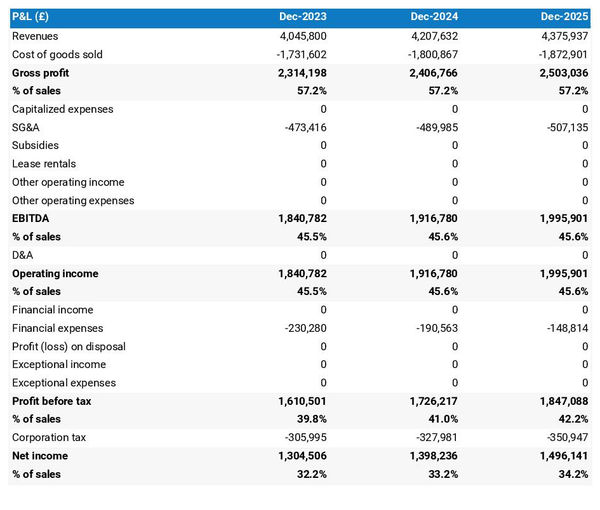
A financially viable P&L statement for a hotel should normally show:
- Sales growing above inflation
- Stable or expanding (ideally) profit margins
- A net profit
This will of course depend on the stage of your business: a new venture might be loss-making until it reaches its breakeven point in year 2 or 3, for example.
The projected balance sheet
The projected balance sheet gives an overview of your hotel's financial structure at the end of the financial year.
It is composed of three categories of items: assets, liabilities and equity:
- Assets: are what the business possesses and uses to produce cash flows. It includes resources such as cash, buildings, equipment, and accounts receivable (money owed by clients).
- Liabilities: are the debts of your hotel. They include accounts payable (money owed to suppliers), taxes due and bank loans.
- Equity: is the combination of what has been invested by the business owners and the cumulative profits to date (which are called retained earnings). Equity is a proxy for the value of the owner's stake in the business.
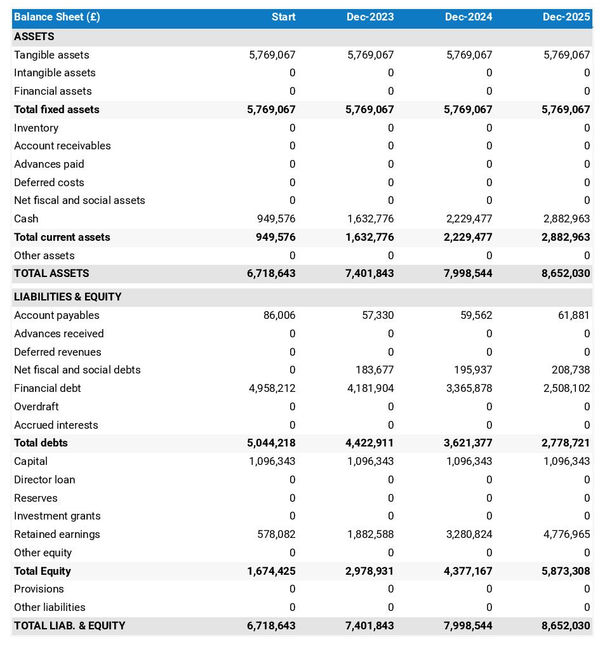
The projected cash flow statement
A projected cash flow statement for a hotel is used to show how much cash the business is generating or consuming.
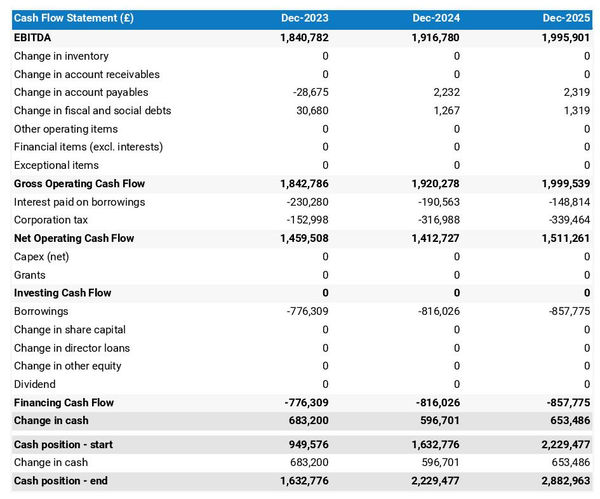
The cash flow forecast is usually organised by nature to show three key metrics:
- The operating cash flow: do the core business activities generate or consume cash?
- The investing cash flow: how much is the business investing in long-term assets (this is usually compared to the level of fixed assets on the balance sheet to assess whether the business is regularly maintaining and renewing its equipment)?
- The financing cash flow: is the business raising new financing or repaying financiers (debt repayment, dividends)?
Cash is king and keeping an eye on future cash flows is imperative for running a successful business. Therefore, you should pay close attention to your hotel's cash flow forecast.
If you are trying to secure financing, note that it is customary to provide both yearly and monthly cash flow forecasts in a financial plan - so that the reader can analyze seasonal variation and ensure the hotel is appropriately capitalised.
Need a convincing business plan?
The Business Plan Shop makes it easy to create a financial forecast to assess the potential profitability of your projects, and write a business plan that’ll wow investors.

Which tool should you use to create your hotel's financial projections?
Building a hotel financial forecast is not difficult provided that you use the right tool for the job. Let’s see what options are available below.
Using online financial projection software to build your hotel's forecast
The modern and easiest way to build a forecast is to use professional financial projection software such as the one we offer at The Business Plan Shop.
There are several advantages to using specialised software:
- You can easily create your financial forecast by letting the software take care of the financial calculations for you without errors
- You have access to complete financial forecast templates
- You get a complete financial forecast ready to be sent to your bank or investors
- You can easily track your actual financial performance against your financial forecast, and recalibrate your forecast as the year goes by
- You can create scenarios to stress test your forecast's main assumptions
- You can easily update your forecast as time goes by to maintain visibility on future cash flows
- You have a friendly support team on standby to assist you when you are stuck
- It’s cost-efficient and much cheaper than using an accountant or consultant (see below)
If you are interested in this type of solution, you can try our forecasting software for free by signing up here.
Calling in a financial consultant or chartered accountant
Outsourcing the creation of your hotel financial forecast is another possible solution.
This will cost more than using software as you can expect as your price will have to cover the accountant’s time, software cost, and profit margin.
Price can vary greatly based on the complexity of your business. For a small business, from experience, a simple three-year financial forecast (including a balance sheet, income statement, and cash flow statement) will start at around £700 or $1,000.
Bear in mind that this is for forecasts produced at a single point in time, updating or tracking your forecast against actuals will cost extra.
If you decide to outsource your forecasting:
- Make sure the professional has direct experience in your industry and is able to challenge your assumptions constructively.
- Steer away from consultants using sectorial ratios to build their client’s financial forecasts (these projections are worthless for a small business).
Why not use a spreadsheet such as Excel or Google Sheets to build your hotel's financial forecast?
Creating an accurate and error-free hotel financial forecast on Excel (or any spreadsheet) is very technical and requires both a strong grasp of accounting principles and solid skills in financial modelling.
Most entrepreneurs lack the expertise required to create an accurate financial forecast using spreadsheet software like Excel or Google Sheets. As a result, it is unlikely anyone will trust your numbers.
The second reason is that it is inefficient. Building forecasts on spreadsheets was the only option in the 1990s and early 2000s, nowadays technology has advanced and software can do it much faster and much more accurately.
This is why professional forecasters all use software. With the rise of AI, software is also becoming smarter at helping us detect mistakes in our forecasts and helping us analyse the numbers to make better decisions.
Finally, like everything with spreadsheets, tracking actuals vs. forecasts and updating your forecast as the year progresses is manual, tedious, error-prone, and time-consuming. Whereas financial forecasting software like The Business Plan Shop is built for this.
Need a convincing business plan?
The Business Plan Shop makes it easy to create a financial forecast to assess the potential profitability of your projects, and write a business plan that’ll wow investors.

Use our financial forecast templates for inspiration
The Business Plan Shop has dozens of financial forecast examples available.
Our templates contain both a financial forecast and a written business plan which presents, in detail, the company, the team, the strategy, and the medium-term objectives.
Our templates are a great source of inspiration, whether you just want to see what a complete business plan looks like, or are looking for concrete examples of how you should model financial elements in your own forecast.
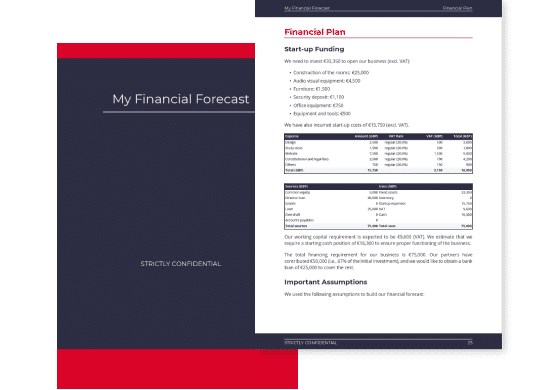
Takeaways
- Having a financial forecast enables you to visualise the expected growth, profitability, and cash generation for your business over the next three to five years.
- Tracking actuals vs. forecast and keeping your financial projections up-to-date is the only way to get a view on what your hotel future cash flows may look like.
- Using financial forecasting software is the mordern and easy way to create and maintain your forecasts.
This is the end of our guide on how to build the financial forecast for a hotel, we hope you found it useful. Don't hesitate to contact us if you want to share your feedback or have any questions.
Need a convincing business plan?
The Business Plan Shop makes it easy to create a financial forecast to assess the potential profitability of your projects, and write a business plan that’ll wow investors.

Also on The Business Plan Shop
- Example of financial forecast
- How to create a sales forecast for a business?
- Sample financial forecast for business idea
Know someone who owns or is thinking of starting a hotel? Share our forecasting guide with them!






